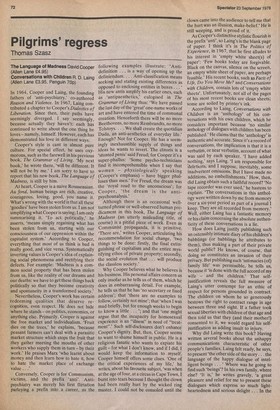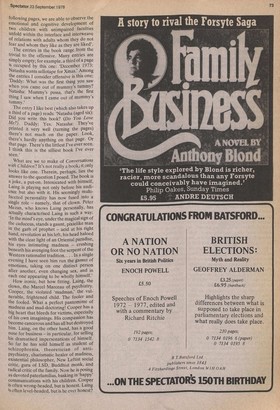Pilgrims' regress
Thomas Szasz
The Language of Madness David Cooper (Allen Lane £4.95) Conversations with Children R. D. Laing (Allen Lane £3.95, Penguin 70p) In 1964, Cooper and Laing, the founding fathers of 'anti-psychiatry,' co-authored Reason and Violence. In 1967, Laing contributed a chapter to Cooper's Dialectics of Liberation. Since then, their paths have seemingly diverged. I say seemingly, because actually they haven't: each has continued to write about the one thing he loves— namely, himself. However, each has demonstrated his love in different ways.
Cooper's style is cant in almost pure culture. For special effect, he uses oxymorons, such as the farewell in his previous book, The Grammar of Living. 'My next book,' he wrote there,' 'will be different. It will not be by me.' I am sorry to have to report that his new book, The Language of Madness, is still by him.
At heart, Cooper is a naive Rousseauian. Au fond, human beings are rich_ creative, courageous, loving, good, you name it. What's wrong with the world is that all these 'goodies' have been stolen from us. I am not simplifying what Cooper is saying; I am only summarising it. `To act politically,' he asserts, 'means simply regaining what has been stolen from us, starting with our consciousness of our oppression within the capitalist system.' According to Cooper, everything that most of us think is bad is really good, and vice versa. Systematically inverting values is Cooper's idea of explaining social phenomena and rectifying their defects. For example: 'Madness is a common social property that has been stolen from us, like the reality of our dreams and our deaths: we have to get these things back politically so that they become creativity and spontaneity in a transformed society.'
Nevertheless, Cooper's work has certain redeeming qualities that deserve recognition, even respect. He does not hide where he stands — on politics, economics, or anything else. Primarily, Cooper is against the free market and individualism. 'Fruit dies on the trees,' he explains, 'because peasant farmers can't deal with a parasitic market structure which stops the fruit that they gather meeting the mouths of other workers who supply them in turn — by their work.' He praises Marx 'who learnt about money and then learn how to hate it, how to hate the market place of exchange value. .
Conversely, Cooper is for Communism, victims, andthe prefix 'anti'. Anti psychiatry was merely his first flirtation parleying a prefix into a career, as the following examples illustrate: 'Antidefinition . . . is a way of opening up the definiendum. . . . Anti-classification means seeking and stating existing differences as opposed to enclosing entities in boxes. . • ' His new antis amplify his earlier ones, such as 'antipaesthetics,' eulogised in The Grammar of Living thus: 'We have passed the last day of the 'great' one-name works of art and have entered the time of communal creation. Henceforth there will be no more Beethovens, no more Rembrandts, no more Tolstoys. . . . We shall create the quotidian Dada, an anti-aesthetics of everyday life.' Enough? Not for Cooper. He has a seemingly inexhaustible supply of things and ideas he wants to invert. The clitoris is a 'stunted penis' said Freud; for Cooper it's a super-phallus: 'Some psycho-technicians find it incomprehensible when I say that women — physiologically speaking (Cooper's emphasis) — have bigger phalluses than men.' For Freud, the dream was the 'royal road to the unconscious'; for Cooper, 'the dream is the antipsychoanalysis.' Although there is an occasional wellturned phrase or well-observed human predicament in this book, The Language of Madness (an utterly misleading title, of course) is a pitiful piece of work. Even as Communist propaganda, it is primitive. 'There are,' writes Cooper, articulating his recommendation for social change, 'two things to be done: firstly, the final extinguishing of capitalism and the entire mystifying ethos of private property; secondly, the social evolution that . . . will produce the classless society.'
Why Cooper believes what he believes is his business. His personal affairs concern us only insofar as he tells us of them, which he does in embarrassing detail. For example, he tells us that he has `no secretary or fixed address': that 'there are no examples to follow, certainly not mine'; that 'when I was mad briefly, but for enough weeks to begin to know a little . . . '; and that 'one might argue that the incapacity for homosexual i experience s an "illness" in need of "treatment".' Such self-disclosures don't enhance Cooper's dignity. But, then, Cooper seems to want to shame himself in public. He is a religious fanatic who wants to expiate his guilt — for what I don't know, and if I did, I would keep the information to myself. Cooper himself offers some clues. 'One of the critical experiences of my life,' he writes, about his favourite subject, 'was when at the age of four, at a circus in Cape Town, I burst into tears because I thought the clown had been really hurt by the wicked ring master. I could not be consoled until the clown came into the audience to tell me that the hurt was an illusion, make-belief.' He is still weeping, and is proud of it.
As Cooper's distinctive stylistic flourish is the prefix 'anti', so Laing's is the blank page of paper. I think it's in The Politics of Experience, in 1967, that he first alludes to his interest in 'empty white sheet(s) of paper': 'Few books today are forgivable. Black on the canvas, silence on the screen, an empty white sheet of paper, are perhaps feasible.' His recent books, such as Facts of Life, Do You Move Me? and Conversations with Children, contain lots of 'empty white sheets'. Unfortunately, not all of the pages of his most recent books are clean sheets; some are soiled by printer's ink.
According to Laing, Conversations with Children is an 'anthology' of his con versations with his own children, which he considers important because `no similar anthology of dialogues with children has been published.' He claims that the 'anthology' is authentic and accurate. Since it's a record of conversations, the implication is that it is a verbatim, or near verbatim, account of what was said by each speaker. 'I have added nothing,' says Laing. 'I am responsible for 'deletions, and I suppose, inevitably, some inadvertent omissions. But I have made no additions, no embellishments.' How, then, did Laing obtain such a faithful record? 'No tape recorder was ever used,' he hastens to explain. 'The conversations in this anthology were written down by me from memory over a six-year period as part of a journal I keep. They are all recorded from memory.' Well, either Laing has a fantastic memory or his claim concerning the absolute authenticity of these conversations is a lie.
How does Laing justify publishing such an ostensibly intimate diary of his children's babblings (or babblings he attributes to them), thus making a part of their private world public? He knows, of course, that doing so constitutes an invasion of their privacy. But publishing such 'intimacies (of) family life' was permissible, he tells us, because it is done with the full accord of my wife — and the children.' That selfjustification reveals the full measure of Laing's utter contempt for an ethic of respect for persons grounded in contract. The children on whom he so generously bestows the right to contract range in age between three and eight. If a father took sexual liberties with children of that age and then told us that they (and their mother!) consented to it, we would regard his selfjustification as adding insult to injury.
Why did Laing write this book? Having written several books about the unhappy communications characteristic of other people's families, Laing felt ready, he says, to present 'the other side of the story. . . the language of the happy dialogue of intelligent beings . . . ' Where was he going to find such 'beings'? In his own family, where else? 'It is,' he writes gravely, 'a great pleasure and relief for me to present these dialogues which express so much lightheartedness and serious delight .. . In the following pages, we are able to observe the emotional and cognitive development of two children with unimpaired faculties unfold within the interlace and interweave of relations with adults whom they do not fear and whom they like as they are liked'. The entries in the book range from the trivial to the offensive. Many entries are simply empty; for example, a third of a page IS occupied by this one: 'December 1973: Natasha wants sellotape for Xmas.' Among the entries I consider offensive is this one: Daddy: What was the first thing you saw When you came out of mummy's tummy? Natasha: Mummy's pussa, that's the first thing I saw when I came out of mummy's tummy: The entry I like best (which also takes up a third of a page) reads: 'Natasha (aged six): Did you write this book? (Do You Love Me?), Daddy: Yes. Natasha: They've Printed it very well (turning the pages) there's not much on the paper. Look, there's hardly anything on that page. Or that page. There's the littlest I've ever seen. I think this is the silliest book I've ever seen.'
.What are we to make of Conversations with Children? It's not really a book; it only looks like one. Therein, perhaps, lies the answer to the question I posed. The book is a Joke, a put-on. Intoxicated with himself, Laing is playing not only before his audience but also with it. His seemingly multifaceted personality has now fused into a single role — namely, that of clown. Peter Mezan, who knows Laing personally, has actually characterised Laing in such a way: 'In the mind's eye, under the magical sign of the caduceus, stands a gaunt, pixielike man in the garb of prophet — acid at his right hand, revolution at his left, his head haloed with the clear light of an Oriental paradise, his eyes intimating madness — crushing beneath his avenging foot the serpent of the Western rationalist tradition.. . . In a single evening I have seen him run the gamut of emotions, taking on one distinct person after another, even changing sex, and in each one appearing to be wholly himself.' How ironic, but how fitting. Laing, the clown, the Marcel Marceau of psychiatry. Cooper, the violated 'madman,' the vulnerable, frightened child. The fooler and the fooled. What a perfect pantomime of madness and mad-doctoring! Cooper has a big heart that bleeds for victims, especially of his own imaginings. His compassion has become cancerous and has all but destroyed him. Laing, on the other hand, has a good nose for business — in particular, for selling his dramatised impersonations of himself. So far he has sold himself as student of schizophrenia, theoretician of antipsychiatry, charismatic healer of madness, existential philosopher, New Leftist social critic, guru of LSD, Buddhist monk, and radical critic of the family. Now he is posing as devoted paterfamilias, basking in 'happy' communications with his children. Cooper is often wrong-headed, but is honest. Laing is often level-headed, but is he ever honest?



































































































 Previous page
Previous page